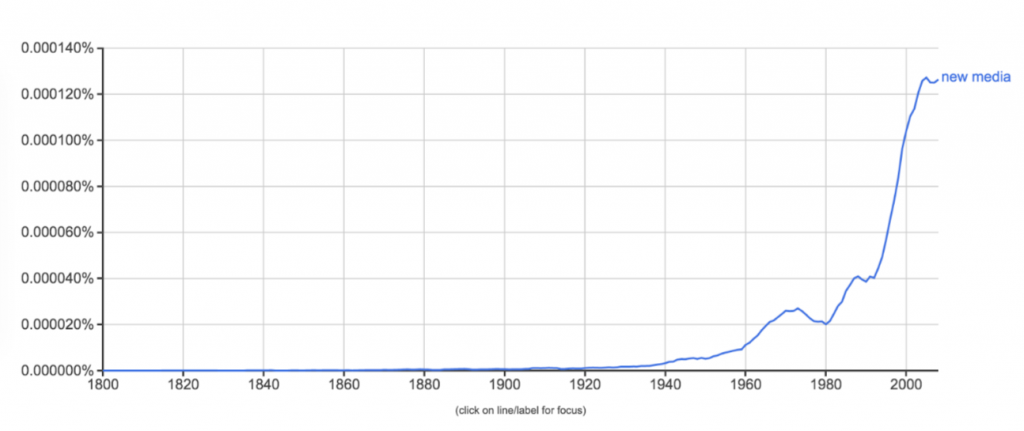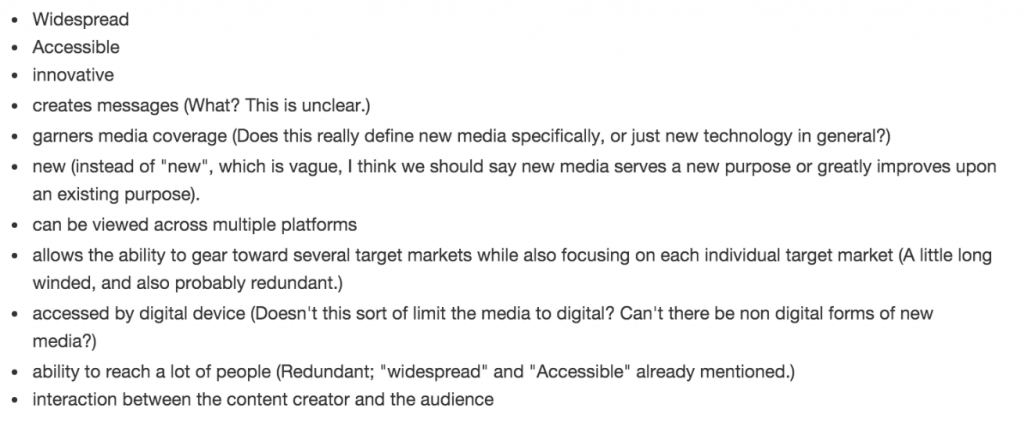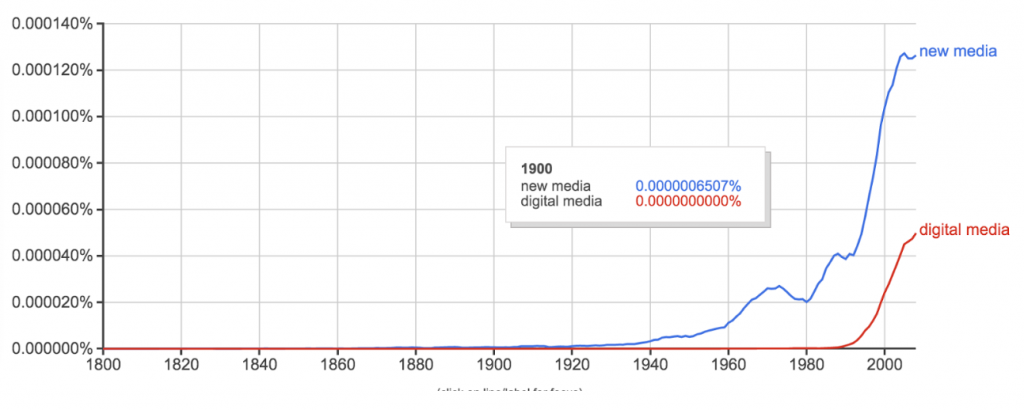
What to watch for
After completing this lesson, you’ll be able to:
- Define new media
- Describe the evolution of the phrase “new media.”
It’s probably not a bad idea to start a class called “Introduction to New Media” by discussing what, exactly, new media is.
Unfortunately, talking about what constitutes new media often feels a bit like this:
(By the way, feel free not to watch all (or any) of that video.1 In fact, throughout the course, you can assume that all videos and links are optional unless otherwise marked.) (Also, here’s a transcript for the video.)
Still, it’s an important question, so let’s do our best to come up with a coherent answer.
A term tied to a specific period of time
One place to start is by looking at when the term emerged. Google Books has a really cool tool called the Ngram Viewer that lets us see changes over time in how frequently a term is used in the books Google can search. It’s not a perfect tool, but it’s a place to start. Here’s the chart for the term “new media”:

The phrase crept into use in the early 1900s, hitting a local high around 1970, after which it declined in usage until 1980. Then, it really took off in the mid ’80s and hit its apparent peak in the very early 2000s, after which usage declines. (The Ngram viewer only searches up until 2008.)
This leads us to a first potential way to understand new media: it’s a phrase that folks began occasionally using around the advent of radio and television, that really took off with the introduction of widespread personal computing, and that peaked in popularity in the early-to-mid aughts.
That’s a start, and it’s definitely relevant, but clearly it’s not sufficient. Let’s press on.
Media… that’s new
When I teach this class in person, I often ask students what they think “new media” means. Here are some of the responses I get:

I also often hear terms like “technology,” “connection,” “actively used,” “ever-changing,” “multiple devices,” “dynamic,” and “large-scale.”
None of those responses are bad—many are quite good!—but they all skip over an essential part of the phrase: “media.”
While risking sounding like an eighth-grade term paper, it’s worth consulting a dictionary to come up with a clear definition of “media.”
To begin, it’s probably worth noting that “media” is actually the plural of “medium.” That is, properly speaking, “media” means “two or more mediums.” 2
Okay, fine—so what’s a medium? Well, it’s “an intervening agency, means, or instrument by which something is conveyed or accomplished,” which on its own is probably a leading contender for Vaguest Possible Definition.3 Still, if you stop and think about it for a bit, it’s really not so bad as all that. We’re not really interested in the “accomplished” part of the definition, so if you strip that out, media are things that convey other things. Still vague, but perhaps usefully so. As we’ll see, “new media” is a term that’s remarkably resistant to being pinned down, so we might actually do well to hold on to such a broad definition.
Things get a little clearer when we move down the definition list a bit and read that media are also “one of the means or channels of general communication, information, or entertainment in society, as newspapers, radio, or television.” Aha! Now we’re on more solid ground—we’re talking about actual, tangible things. “Newspapers radio, or television”—those are the things that were around when we first saw “new media” begin to emerge in our Ngram. So, maybe “new media” means “new means or channels of general communication, information, or entertainment in society.”
That’s not bad at all! We’re done, right?
Well, not quite. If you stop and think about it for a bit, there’s one big problem that definition doesn’t address.
What happens when new isn’t new anymore
Let’s look at that Ngram again.

“New media” first came in to use in the early 1900s, and that makes sense. Think of all the “new” media that was introduced then. Radio! Television! Truly, the mediums of the future!
And you know what? They were the mediums of the future 4, but that future has now become our past. That’s going to be a problem so long as the arrow of time keeps moving forward—what’s new now soon won’t be.
So, perhaps it’s best to think of new media as emerging media5. “Emerging” is an adjective formed from the present participle of “emerge”—it means something that is in a continuous state of coming into being. This nifty linguistic trick helps us keep talking about “means or channels of general communication, information, or entertainment in society” that are new at whatever point in time the present “now” happens to be.
We’re almost there, but there’s another point that’s worth making.
Let’s get digital
One last look—I promise—at that Ngram.

Boy, “new media” sure took off between, say, 1985 and 2005, didn’t it?
As I mentioned, this period of growth in the use of “new media” coincides with the mass adoption of personal computers, the internet, cellular networks, MP3 players, and DVDs. In short, it coincides with digital media.
Did you know that you can compare two terms with the Ngram Viewer? I bet you didn’t! And I bet you don’t really care! And that’s okay! Let’s do it anyway! Here’s “new media” and “digital media”:

As you might expect, digital media only really takes off in the very late 80s / early 90s—most people couldn’t really meaningfully do digital media until then. But look—the rise of digital media almost perfectly coincides (on a slight lag) with the major growth period of “new media.”
I believe that what most people really meant when they started talking about “new media” in the 1985-2005 period was digital media. They just didn’t know it yet, and they already had the term “new media” laying around, and it seemed to fit well enough, and there you have it. Most of the time, what most people mean when they say “new media” is “digital media”6 or, more pedantically, “emerging digital media.”
Okay, phew, so now we’re finally done, right?
Not yet—we’re so very close, but there’s one final point that we need to talk about.
All the things are digital now
So yeah, the overwhelming majority of all media is digital now. Plenty of people could object that that’s a gross exaggeration, and in many ways they’d be right7, but here’s the thing: not really. As we’ll talk about at length in future lessons, the numbers are overwhelmingly on the side of digital media, so much so that non-digital media is now often referred to as “legacy media.”
So, if all media is now, for all practical purposes, digital, the phrase “new media” becomes a bit like that old Mark Twain quote—do we really need to say “new” (or even “digital”) any more? 8
To be honest, that’s a fair point, and a potentially unsettling one for someone enrolled in a course about new media9. However, here’s what I say to that:
New / digital media is everywhere—it’s such an essential part of life for nearly everyone now. But, we’re nowhere near done with it. In fact, as Kevin Kelly argues,
“…we are still at the beginning of the beginning. We have just started to make a technological society. The technological changes in the next 20 years will dwarf those of the last 20 years. It will almost be like nothing at all has happened yet.”
If we really are poised to live through such a revolutionary era—and I think there’s an excellent chance that we are—then knowing how we got to the present era of new / digital media, how it works, and where things are headed just might be extremely useful—and valuable.
Lucky for you, that’s exactly what this course is about.
Discussion questions
Welcome to our first section of discussion questions! They’ll always be in purple boxes like this one.
These discussion questions are here to get you started, but by all means, take the conversation in any direction you’d like. Have fun!
- Talk together in your group to come up with a definition of new media based on this lesson.
- What parts of new media have most affected your life? Your parents’ lives?
- Contact someone 20 or more years older than you, and ask them about what new media or technology they were most excited about at age 10 and then at age 30.
- Per the interview with Kevin Kelly linked to in this lesson, do you think we’re at the beginning of the beginning of a technological revolution? Why or why not?=
- Play around with the Ngram viewer to track references to other pieces of technology (e.g., pagers, 8-tracks, floppy disks, cell phones, the Internet, etc.). Look for interesting trends, and talk about what might cause them.
- Share a favorite Monty Python clip with the group, if you have one. 🙂
Words on / reading time for this page: 1,725 words / 8-12 minutes
Words in / reading time for required readings: 0 / 0
Total words in / reading time for this lesson: 1,725 words / 8-12 minutes
Though why wouldn’t you want to? 🙂↩
Though, as our dictionary itself notes, “Media, like data, is the plural form of a word borrowed directly from Latin. The singular, medium, early developed the meaning “an intervening agency, means, or instrument” and was first applied to newspapers two centuries ago. In the 1920s media began to appear as a singular collective noun, sometimes with the plural medias. This singular use is now common in the fields of mass communication and advertising, but it is not frequently found outside them: The media is(or are) not antibusiness.”↩
It’s such an honor to win a Vague-y!↩
Hence the emergence of the phrase “new media” around the time of their introduction.↩
In fact, this is the name of the master’s degree program affiliate with the New Media Institute—the Emerging Media Masters program↩
Don’t worry: we’ll talk plenty in a future lesson about what exactly “digital” means.↩
See the recent resurgence in vinyl records and even print books, for example.↩
Another way to look at it (kind of—the general notion fits, if not the specifics) is this Louis C.K. clip, which is one of my favorite things ever. (Please forgive the crass language at the end.)↩
And doubly so for someone employed in the New Media Institute.↩